GROUND
ZERO PLUS 1115 DAYS,--New York, NY, Friday,
October 1, 2004--Civilization
is haunted by its own thirst to advance--at least that's the
message from rattlesnakes and rats from coast to coast.
Both
are Terrorizing and being Terrorized by each other's Darwinian
drives to command the land clashing with the same demands
of humans.
I'm
a veteran of both victims in the battlefield of humans versus
rats and rattlesnakes.
 |
|
The
story of Rancho Mission Viejo began nearly 100 years
ago when partners Richard O'Neill, Sr. and James Flood
bought Rancho Santa Margarita y las Flores in northern
San Diego County (now Camp Pendleton) and its adjoining
Rancho Mission Viejo and Rancho Trabuco in southern
Orange County. Collectively spanning more than 200,000
acres and stretching from Aliso Creek (near El Toro
Road) south to Oceanside, the combined properties were
acclaimed by many as "the greatest of all California
'ranchos.'"
|
Over
three decades ago a new development was being carved out of
sagebrush in burgeoning Orange County, California. Its name
was Mission Viego, a former Spanish land grant of 52,000 acres
known then as Rancho Mission Viejo plus additional land that
in 1907 fell into the hands of an Irish cattleman named Richard
O'Neill and James Flood ("stolen from" is the Spanish
version) and was the pristine Southern California land that
was ultimately sold to Phillip Morris.
Phillip
Morris, as most tobacco companies, had the foresight to expand
profits from tobacco leaves into real estate, insuring investors
the stock would be solid even when people started dropping
like flies from lung cancer.
When
the bulldozers began carving into the Mission Viejo earth
where rabbits, coyotes and rattlesnakes once lived the drama
of simple survival--i.e. you only ate what you killed and
left the rest for someone else to eat--the rattlesnakes became
confused. Their former habitat was being subdivided. Explosions
blew away rocks, giant bull dozers raped the earth of vegitation
where the snakes hid in wait for a mouse or rabbit. In one
fell swoop, their land was denuded--a kind of microcopic ravaging
of the rain forests, only this was knee-high sage close enough
to the ocean to not require air-conditioning.
 |
Richard
O'Neill |
Tens
of thousands of male, femal and baby rattlesnakes slithered
about in hysteria as giant D-4 dozers dropped their iron scaples
and sliced off the skin of the earth, eliminating thousands
upon thousands of years of Snake Villages and lairs where
generations upon generations of rattlers had been born and
bred.
Confused,
the snakes sought refuge in mail boxes, garages, cars and
even inside living and bedrooms in the houses that began sprouting
up in Mission Viego. The old was being replaced with the new.
A couple of bricks around the foundation of a house became
a new home for a family of rattlers.
The
cool concrete of a garage floor was relaxing to a six-foot
rattler, and the water heater, dark and yet warm, provided
a perfect place for mother rattler to lay some eggs and breed
her new brood.
There
was only one catch. Human beings aren't akin to living with
rattle snakes, even if they disenfranchised the reptiles from
their own homes. Few citizens of Mission Viejo walked around
protesting the Rights of the Rattlers.
"Skin
'Em...Skin 'Em..." came the chorous rather than the old
saw: "Snakes Have Rights Too!"
Parents,
frightened their children might be snagged by the fangs of
a rattler when chasing a ball in the front yard, roared for
rattler elimination. Snake wranglers were brought from afar
(Montana) to rid the reptilian threat from the community.
As soon as one batch was attacked, a new legion would appear.
Mission Viejo was being built in sections, so once the heavy
equipment began stripping the soil for housing pads, a new
army of rattlers vermiculated their way to homes of the humans,
appearing in vast numbers on lawns and in back yards, swimming
pools, garages, mail boxes.
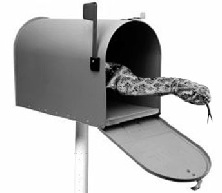 |
Rattlesnakes
were everywhere - even in mailboxes |
People
were more worried about the rattlers getting their kids on
the way to school than they were neighborhood perverts. The
"Don't Tread On Me" logo of the rattlesnake from
the Revolutionary War was put aside in favor of: "Get
The Hell Outta Here" signs.
Eventually,
as concrete covered sage, as sewer rivers replaced water tables,
as mouse traps killed breakfast, lunch and desert, and as
animal control units lassoed and bagged snake after snake,
the threat waned.
Mission
Viego finally shed its title as Rattler Viejo. Its prices
soared, and the majority of people forgot to remember they
had shoved the snakes out to make place for their children's
safety. After all, who is more important--a baby rattler or
a human baby?
That
was the West Coast side of the story.
Now,
the East Coast side. In this chapter, the rattlers are replaced
by rats.
New
York City, at least the immediate community of the East Village
around Second Avenue and Third Street, is the center of another
exodus of vermin for similar reasons as the rattlers faced
in Mission Viejo.
 |
|
A
new voluptuous building,
a
"sculpture for living", is
being constructed at Astor Place |
A
new, voluptuous building is soaring up in the heart of the
East Village, where apartments begin around $1,000,000. To
many residents, this towering symbol of opulence signals the
end of the boehemian nature of the East Village, a precursor
that it is going to convert from the "revolutionary sagebrush"
into a land of rich and famous people seeking association
with the "earth people."
In
many ways, the East Village is the last nipple on Manhattan's
list of "most desired living places." Originally,
immigrants filled the community, and its most famous of all
location--a block or so from the towering new apartment high-rise--is
Bowery Street.
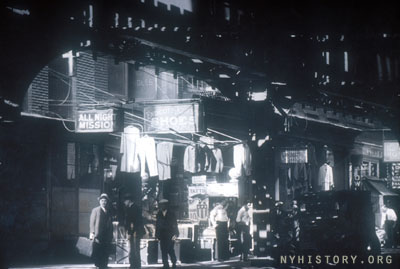 |
"The
Bowery" was a place where drunks and rats slept
side by side |
"The
Bowery," as it is noted in historic legacy, was a place
where drunks and rats slept side by side, both marginalized
by society, living in the sewers and ruts and cracks and crevices
of the shadows of uptown and downtown.
But
now that's on the way out.
Civilization
has decided to erect a monolith of prosperity, and in the
process, ripped out the viscera of the East Village in the
process. Giant cranes drive pilings deep into the earth that
has been scooped out next to Cooper Union where a large parking
lot once stood.
Beneath
the earth, where the rats live and have bred for countless
decades, the vermin's homes are endangered. Their "property
rights" are being challenged by progress. Like the rattlers
in Mission Viejo, they have become DP's, displaced persons,
or better put, DV's, displaced vermin.
In
Mission Viejo, I didn't get a chance to participate in the
"Rid The Rattlers" groups, for I purchased a home
there after the rattlers had been tucked into oblivion, their
skins wrapped around cowboy boots, pressed into belts and
headbands, and their rattles sold at auction.
But
last night in the East Village I did get to attend the Rid
The Rat Meeting held at a community center at 331 Bowery.
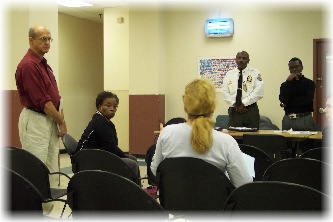 |
Residents
voiced their concerns about the influx of rats |
In
attendence were local community politicians and represenatives
from the mayor's office and the sanitation department.
Residents
were upset about the influx of rats.
Many
reasons were proffered about the rats. One of them, of course,
was the increased building in the East Village. Others included
that garbage is put in plastic bags, an easy chomp or two
by the incisors of a rat to feast on that which waits inside.
Steel
garbage containers in large living complexs were also the
targets of discussion, since metal garbage containers are
only a suggestion and not a law, a requirement. Many proposed
the community force legislation to require metal containers
with metal lids and to completely empty the trash from the
bins so rats won't breed underneath the compacted garbage.
Then
there was the feeding of pigeons. Signs around the East Village
are blunt about the seemingly harmless act of feeding pigeons.
Signs bark out the message: "Feed A Pigeon--Breed a Rat!"
 |
I
learned feeding pigeons promotes rats |
It
seems the joy of feeding pigeons also attracts rats. What
the pigeons don't eat, the rats do, and when they know there
are hoards of people throwing food into their mouths, they
aren't eager to move on. I was surprised to hear that the
fine for feeding pigeons is $100!
In
other words, the people were saying, "handouts promote
rats."
The
turnout was slim last night for a couple of reasons. One,
the weather wasn't that good--rainy, cool and not a nice night
to tromp about. The other was that it was the Yankees last
home game, and a chance for them to break several records
by winning their division.
Rats
or the Yankees! Not a hard choice for many.
 |
|
Michele
Tosic (center), assistant director for community relations
for the City's Dept. of Health and Mental Hygiene |
I
shot pictures and got the card of Michele Tosic, assistant
director for community relations for the City of New York's
Department of Health and Mental Hygiene.
I
also talked with a woman who had her two-year-old child with
her and was concerned about the welfare of her little one.
Rats and kids don't get along.
I
walked away from the meeting wondering not so much about whether
the rats would be elimininated because I knew that would never
happen. Unlike rattlesnakes, rats are symbiotic partners with
humans. They thrive off human waste.
The
more people pressing, jamming, pushing to live in New York
City or other metropolitian areas, the more rats there will
be. One cannot exist without the other, even if humans would
prefer this axiomatic fact not to be possible.
As
long as humans throw away anything that can be eaten, the
rats will be there to gobble it up, even if they have to evolve
teeth that can eat through steel.
I
applauded the City of New York for showing up, and showing
concern. The mother and child were the highlights of the evening.
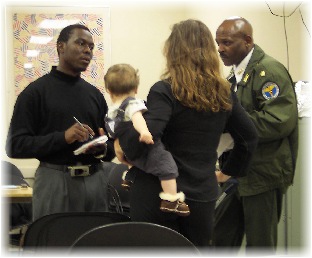 |
The
City Officials gave the mom the most attention |
Rats
are little furry Terrorists to a mother. They can sneak in
when a mom isn't looking and bite a child, or, drop some waste
infected with some disease.
Of
all the people there, the City officials gave the mom the
most attention. She was holding in her arms the future of
New York City and the world--a child. The rats were to her
Osama bin Laden.
I
wondered if the U.S. government thought of Terrorism as rats,
and huddled all its resources around a frightened mother,
and worked to assauge her fears for her children as the primary
motive for all actions against Terrorism, if the war on Terrorism
might be won a lot faster without all the politics that seem
to muck up the waters.
There
was little politic-ing regarding the concern of the City and
the mother last night. Everyone had their pens out and were
noting the mother's concern, for the child she held in her
arms was more of an exclamation of necessity than any ranting
or raving, any screams or shouts that other citizens might
emit during the discussions.
There
is no easy solution to ridding rats from the City of New York.
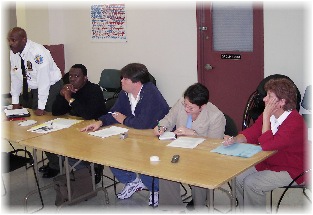 |
Officer
Priester (left), the representative from the Health
Department and the three city officials with input from
the audience collaborated on how to help the mother
protect her child from rats |
But,
there was a primary decision made last night by City officials,
the representative from the City Department of Public Health
and Officer Priester from the New York Department of Sanitation.
That was to help the mother protect her child, and do it now.
That
made me feel good.
I
know the War On Terrorism is an endless one. But, any one
Terrorist can be found and rooted out, and prosecuted, and
made an example of.
I
hope the rats who threaten the mother take heed of this when
the City wipes out their Rat Terrorism Nests around the mother
and child's building.
One
rat at a time--One Terrorist at a time.
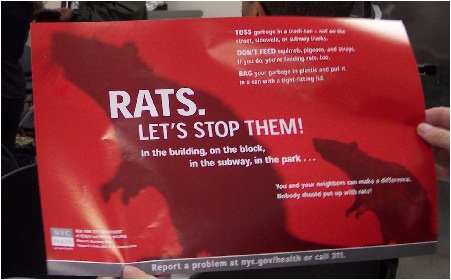 |
One Rat
At A Time -- One Terrorist At A Time!! |
Maybe,
when we fight Terrorism to protect the children, we'll achieve
something far greater than trying to fight it to win votes.
Last
night the City got one big vote...from a mother.
Look
out rats!
Go
To September 29 Story: "A Close Call Of Legal Terrorism"


.jpg)













